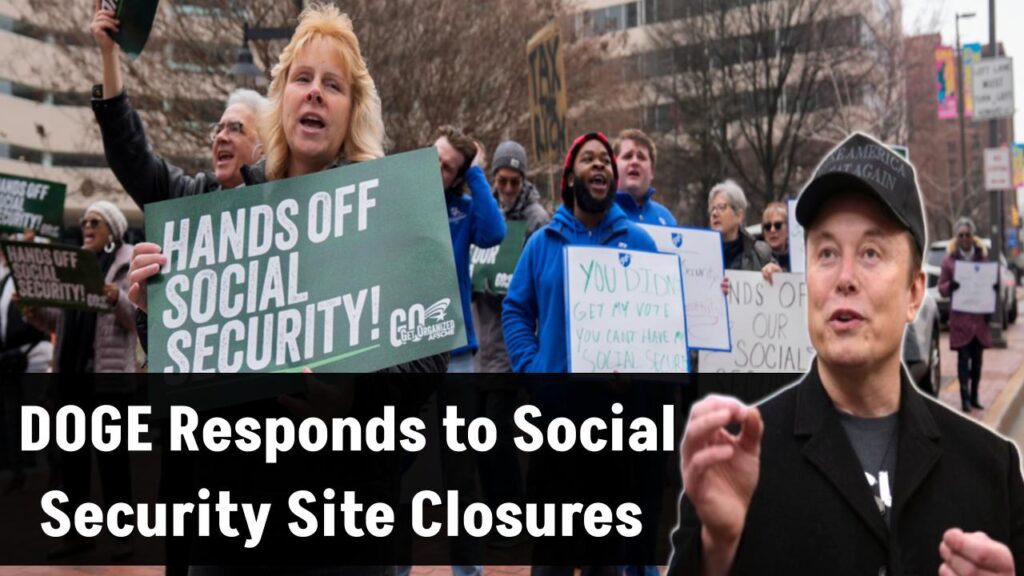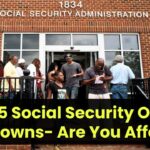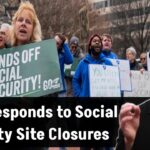
In recent weeks, a wave of concern has swept across the United States as DOGE (Department of Government Efficiency), under the leadership of Elon Musk, initiated the closure of 47 Social Security Administration (SSA) field offices. This decision has sparked nationwide backlash, particularly in southern and southeastern communities, where many Americans rely heavily on in-person SSA services.
If you’ve heard about these closures and are wondering what they mean for you, your benefits, or your family, you’re in the right place. This article breaks down what happened, why it matters, and what you should do next to stay protected and informed.
Also Check: AI Crackdown on Social Security Fraud! DOGE on the Hunt for Scammers – Are You at Risk?
Why Are SSA Offices Closing?
The SSA provides critical services such as retirement benefits, disability assistance, and Medicare enrollment. Traditionally, many people—especially seniors and individuals with limited internet access—visit local SSA offices for help with paperwork, identity verification, and resolving account issues.
The Department of Government Efficiency (DOGE), established to cut bureaucracy and save taxpayer dollars, recently proposed a cost-saving measure: closing select SSA field offices deemed “underutilized.” While this may sound efficient in theory, in practice, it’s causing real anxiety for vulnerable populations.
Why This Matters
Closing an SSA office isn’t just about a building shutting its doors. For many, it’s about:
- Losing direct access to caseworkers who can help with complex forms.
- Longer wait times on the phone (already averaging over 35 minutes according to the Wall Street Journal).
- Delays in receiving Social Security checks, especially when identity verification is required.
- Digital literacy gaps among older adults leading to increased frustration.
- Equity concerns for historically underserved communities.
What DOGE Says About the Closures
DOGE has clarified that these closures are not a sign of nationwide shutdowns. Instead, they are part of a “digital transformation strategy” to encourage online use of SSA services.
“The closures are targeted and reversible. We want to prioritize efficiency while still protecting access,” a DOGE spokesperson told Newsweek.
However, critics argue this strategy disproportionately affects:
- Older adults who are less tech-savvy
- Rural residents with poor internet access
- Non-English speakers who rely on in-person translators
- Low-income individuals who depend on face-to-face services
Also Check: Aadhar Card Crimes Alert! Avoid These Actions or Face Jail Time and a ₹1 Lakh Fine
SSA’s Response: Reassurance and Revisions
Amid public outcry and bipartisan criticism, SSA Acting Commissioner Leland Dudek responded with both reassurance and adjustments. Most notably:
- Three offices in North Carolina have been removed from the closure list (News & Observer).
- SSA will continue public-facing operations and has pledged to be more transparent moving forward.
- Dudek emphasized a future of hybrid service models, mixing digital tools with regional walk-in centers.
What to Do If Your Local SSA Office Is Affected
If your local SSA office is on the list of closures or if you are experiencing delays, here are five steps you can take right now:
1. Use SSA Online Services Whenever Possible
Visit SSA.gov to:
- Apply for retirement or disability benefits
- Check application status
- Request replacement Social Security cards
- Update banking information for direct deposits
- Schedule phone or video appointments where available
2. Call SSA Early or Late in the Day
SSA’s national helpline (1-800-772-1213) is often busiest midday. Try calling:
- Between 8:00 a.m. and 10:00 a.m.
- Or after 4:00 p.m., Monday through Friday
3. Locate an Alternate Office
Use the SSA’s office locator tool to find nearby alternatives if your location is closing.
4. Contact Your Congressional Representative
Many lawmakers are actively involved in pushing back against the closures. They can:
- Escalate urgent SSA cases
- Provide alternative resources for help
- Submit public comments and petitions on your behalf
5. Stay Updated on Future Changes
Sign up for SSA alerts at SSA Email Updates. This will keep you in the loop about changes to office operations or policy.
Who Is Most Affected by the SSA Closures?
Demographics most impacted by the SSA closures include:
- Low-income seniors: Especially those without internet or mobile devices.
- People with disabilities: Who may need in-person support for complex needs.
- Non-native English speakers: Who benefit from multilingual staff in offices.
- Rural Americans: Where broadband access is limited and SSA offices are few and far between.
- Homeless individuals or those in transitional housing, who may lack mailing addresses for secure communication.
Broader Implications
The SSA closures are part of a larger debate about the role of technology in public services. While digitization can reduce costs, it also risks alienating those who most need help.
Experts from the Urban Institute and Brookings Institution emphasize the need for “inclusive modernization”—combining innovation with access equity.
“Public agencies must balance efficiency with empathy,” says Dr. Anita Rowe, a senior fellow at the Urban Institute. “Technology should empower, not exclude.”
(FAQs)
1. Will my Social Security check stop if my local office closes?
No, your benefits will continue. However, delays can occur if you need to verify identity or change account details.
2. Can I still speak to someone in person?
Yes, but you may need to travel farther or schedule an appointment online or by phone first.
3. How do I know if my SSA office is closing?
Check updates on the SSA official website.
4. What if I don’t have internet?
You can still call SSA directly or visit another open office. Community centers and libraries often provide internet access.
Also Check: Earn ₹20,000 Every Month! Invest in This Unique Scheme – Learn How to Benefit










